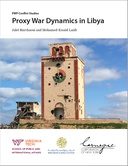Explore

Proxy War Dynamics in Libya
Mohamed-Essaïd Lazib and Jalel Harchaoui
2019
Littered with a myriad of micro-conflicts, Libya’s fragmentation cannot be summarized as a binary contest between regions (e.g., east vs. west), ideologies (e.g., Islamists vs. secular authoritarians), or geopolitical camps (e.g., Egypt vs. Turkey). Foreign interference has had a substantial effect on the itinerary of the relevant proxies, but these proxies have never given full obedience to their sponsors. This work’s aim is to sketch out the dynamics of proxy warfare in Libya by examining a select set of individual armed groups and describing their interactions with the relevant outside sponsors.
The Proxy Wars Project (PWP) aims to develop new insights for resolving the wars that beset the Arab world. While the conflicts in Yemen, Libya, Syria, and Iraq have internal roots, the US, Russia, Saudi Arabia, Iran, and others have all provided military and economic support to various belligerents.
Why read this book? Have your say.
You must be logged in to comment.
Rights Information
Are you the author or publisher of this work? If so, you can claim it as yours by registering as an Unglue.it rights holder.Downloads
- 36 - epub (CC BY-NC-ND) at Unglue.it.
- 21 - pdf (CC BY-NC-ND) at Unglue.it.
Keywords
- 1960s
- Al-Qaeda
- America
- American Politics
- Awaqir
- Black Power Movement
- Broadcasting
- Civil rights
- Civil war
- Cold War
- Derna battle
- government of national accord
- Haftar
- Insurgency
- Iran
- Iraq
- Islamic state
- Kurdish Regional Government
- Libya
- Libyan National Army
- Madkhali Salafis
- Mahjub Brigade
- militias
- Model Cities Program
- Petroleum Facilities Guard
- Propaganda
- proxy warfare
- Sexual Revolution
- Subul al-Salam
- Suq al-Jumaa Martyrs
- Television
- Tripoli Revolutionary Battalion
- turkey
- United States
- Zintani Militia
- Zway
Links
DOI: 10.21061/proxy-wars-harchaoui-lazibweb: http://publishing.vt.edu/site/books/10.21061/proxy-wars-harchaoui-lazib/
Editions










